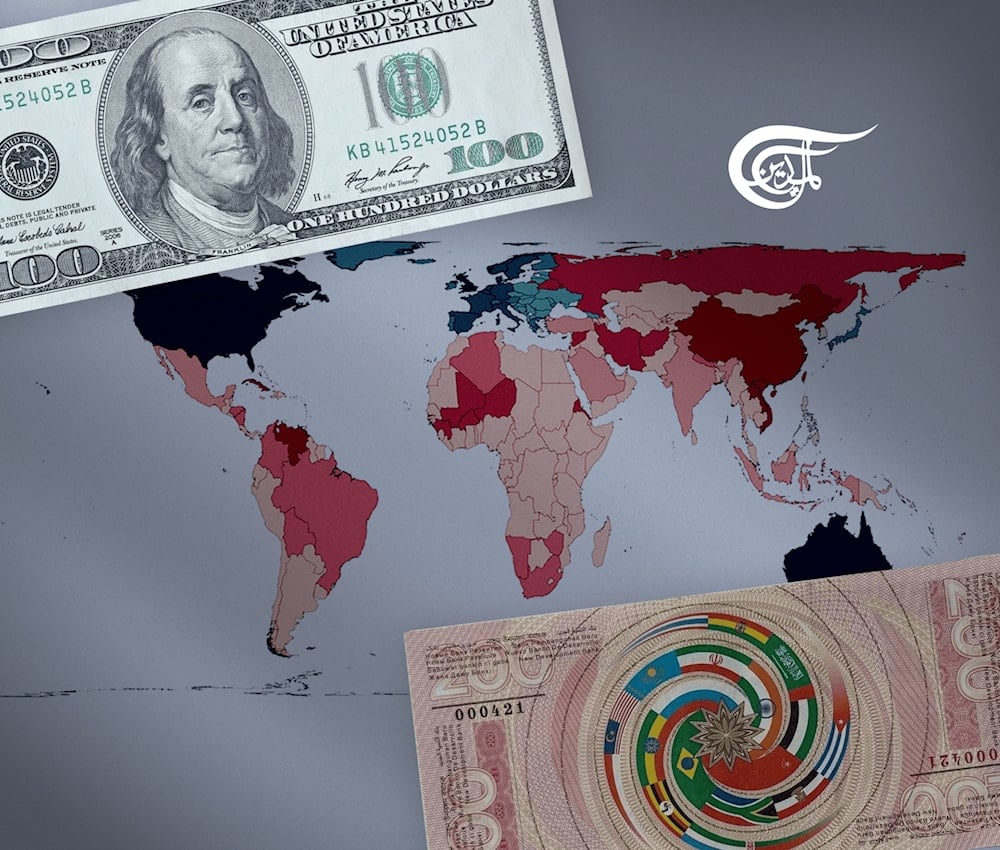Understanding the Global South: Missed opportunities or a rising force?
In 2025, the Global South is asserting economic and political influence through BRICS+, regional alliances, and alternative trade systems, but deep divisions and underdevelopment still hinder its ability to replace the Western-led order, writes Hamzah Rifaat.
-

There is little doubt that many developing countries continue to be dismayed by reckless US adventurism as well as Europe’s indifference to the plight of their economies. (Al Mayadeen English; Illustrated by Mahdi Rtail)
Rising populism domestically, pernicious tariffs internationally, decoupling measures on trade, and quests to maintain economic hegemony amid domestic upheaval characterize the Western led world order in 2025.
The proponents of the Bretton Woods system are seen practicing crass capitalism in the absence of egalitarianism, resulting in a fractured world system and ignoring existential challenges confronting the Global South. What is being witnessed in 2025 is liberal hegemony going hand in hand with Donald Trump and his cohorts riling against alternative economic forces in the South such as China, amid failures of monetary institutions such as the IMF, the World Bank and the WTO to ameliorate the plight of countries in Latin America, Africa, the Middle East and Asia. Many in these regions are pursuing economic alternatives in 2025, including de-dollarization and post-conflict realignments to hedge and deal with the failure of the Western led world order.
Key developments in August 2025 include BRICS+, shrewd diplomacy from the African Union, and the MENA region’s shifting alliances, all pointing to the Global South becoming a rising force.
But can the Global South replace the Western or Global North led order? Or can such efforts best be described as hedging and balancing to cater to domestic needs?
The answer is not that simple.
Nuances explain the Global South’s 2025 pursuits
While there is little doubt that the outcomes of the BRICS+ Summit in August 2025, such as the planned operationalization of common trading currencies, and Latin America’s regional blocs such as the Community of Latin American and Caribbean States (CELAC) and Mercosur moving towards independent foreign policies to decrease their reliance on institutions such as the IMF, indicate that the Global South is becoming a rising force, to come up with such sweeping statements is factually incorrect. A balanced and nuanced understanding is needed to determine whether the Western world order can be replaced by emerging developing countries.
To answer these questions, I interviewed Dr. Amitav Acharya, author of the book ‘The Once and Future World Order: Why Global Civilization Will Survive the Decline of the West’ published by Basic Books, New York City, for Al Mayadeen English. The objective of this one on one conversation with Dr. Acharya was to get a sense of what efforts from the Global South in August 2025, actually indicate vis à vis the presence of a Western dominated international system.
The BRICS plus group does not represent the Global South beyond rhetoric, but it is the symbolic face of the power of the South. There is then the Poor South as well. Despite these glaring differences, the Global South will remain relevant as long as the idea of the West as a self-styled entity that views itself as culturally, racially and intellectually superior to the East remains.
Dr. Amitav Acharya, Interviewed 6th of August, 2025
Dr. Acharya acknowledged that the Global South have a shared anti colonial heritage and bore the brunt of former powers (constituting the majority of the Global North today) robbing Africa, Asia, and Latin America of their indigenous resources. and the slave trade in the colonial era becoming the epitome of injustice taking place worldwide. However, he also cautioned that this does not entail an alternate world order emerging given that countries in the Global South continue to face challenges of underdevelopment and political insecurity which prevent them from becoming a force to be reckoned with.
Dr. Acharya’s insights also suggest that analysts, scholars and experts need to be careful about generalizing about the Global South given that challenges of unity, sense of purpose, and diversified domestic economic landscapes remain existential impediments and roadblocks. While intergovernmental military alliances in the West, such as NATO, continue to have unified priorities such as the containment of Russia vis a vis Ukraine, such priorities are not agenda items for the Global South, who prefer a measured, non-hegemonic and strategic approach.
At the same time, there is little doubt that many developing countries continue to be dismayed by reckless US adventurism as well as Europe’s indifference to the plight of their economies. Instead of adopting a pragmatic approach towards offsetting economic woes in the developing world the Trump administration in Washington D.C. continues to be distracted by internal fissures and military support for rogue regimes such as Israel. The European Union too, has witnessed its influence wane due to post Ukraine policy making teetering towards oblivion and economic freefall.
The response of the Global South has been to adopt initiatives such as the BRICS bank, the Belt and Road 2.0, and the African Continental Free Trade Area (AfCFTA) to hedge, strategize, and move beyond traditional binaries which have fractured the global order. Slowly, but surely, regional payment systems are gaining influence as well as CBDCs or Central Bank Digital Currencies coupled with advocacy for multipolarity from major players such as South Africa, China, Russia and India as newly industrialized countries. The Global South is also more assertive in denouncing economic and political injustices in the G20, the UNSC, and COP30, which makes these countries ambassadors of change and proponents of justice.
Yet institutional weaknesses, internal divisions in the form of the India-China rivalry and differing ideologies dampen the Global South’s ability to replace the Western led world order. Yet fewer can doubt that these countries are drivers of change and are constantly striving for a more just and equitable world.

 Hamzah Rifaat
Hamzah Rifaat
 5 Min Read
5 Min Read











